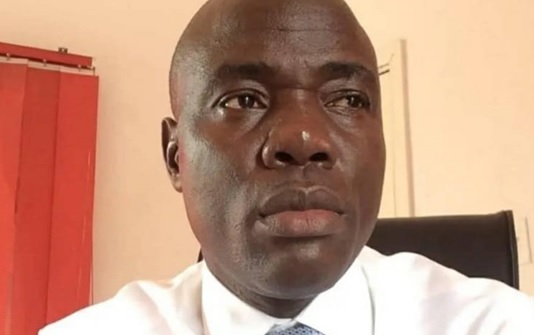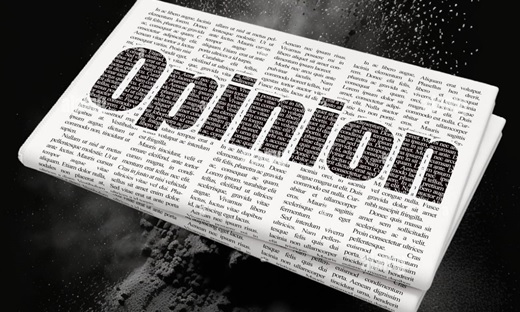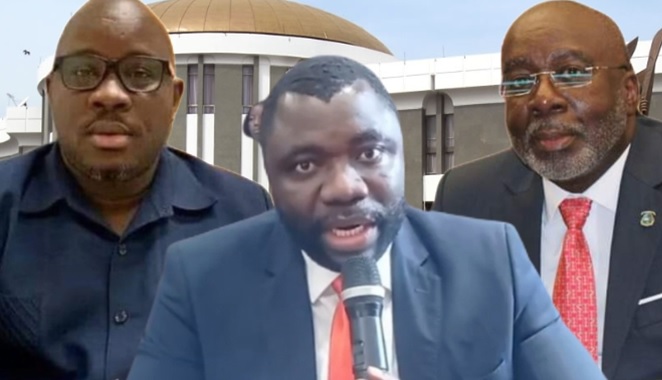MONROVIA, LIBERIA – The Office of The War & Economic Crimes Court of Liberia has issued a statement in response to a press release from a coalition of civil society organizations. This coalition, under the aegis of the Coalition for the Establishment of War and Economic Crimes Courts in Liberia and the Human Rights Community of Liberia, has challenged the qualifications of Cllr. Jonathan T. Massaquoi, the Executive Director of the Office. The civil society groups argue that Massaquoi’s legal representation of individuals accused of war crimes disqualifies him from his current role.
The Office of the War and Economic Crimes Court in a press statement issued on Monday, June 24, 2024, and signed by the secretariat expressed concern that such arguments could undermine efforts to combat impunity and promote justice and accountability in Liberia. The Court emphasized that these criticisms reflect a misunderstanding of the legal system and the role of lawyers within it. To clarify the situation for the public, the Office outlined several key points.
First, the Office cited Article 21(i) of the 1986 Constitution, which guarantees the right to counsel and the inviolability of the lawyer-client relationship. This provision ensures that all accused individuals have the right to legal representation and that lawyers cannot be sanctioned for representing their clients, regardless of the charges against them. The Office noted that this principle is a fundamental aspect of both local and international criminal law.
Second, the Office highlighted the broader context of legal immunity for lawyers, which is recognized globally. It pointed to precedents from international bodies like the International Criminal Court (ICC) and the United States. For example, Karim Ahmad Khan, now the Chief Prosecutor of the ICC, previously served as defense counsel for high-profile figures such as Charles Taylor. Similarly, U.S. Supreme Court Justice Ketanji Brown Jackson represented Guantanamo Bay detainees before her appointment. These cases demonstrate that representing accused individuals does not disqualify a lawyer from holding high office.
The Office argued that accepting the coalition’s logic would imply that distinguished legal professionals like Khan and Jackson are unfit for their roles, a notion it described as flawed and unreasonable. It underscored that lawyers perform a crucial role in the justice system by ensuring that all defendants receive a fair trial, which is essential for upholding the rule of law.
Furthermore, the Office defended Cllr. Massaquoi’s qualifications, citing his 15 years of ethical and professional legal practice. Massaquoi has never faced disciplinary action and has served as amicus curiae in the Supreme Court of Liberia. The Office expressed confidence in his ability to lead the team and fulfill its mandate effectively.
The Office also welcomed comments from U.S. Congressman Chris Smith, who praised President Boakai’s appointment of Massaquoi. It assured both local and international partners that Liberia is committed to delivering justice for victims of human rights violations and economic crimes.
In conclusion, the Office reiterated its openness to engaging with genuine civil society organizations advocating for accountability and the rule of law. It emphasized that such collaborations are vital for the success of the Court’s mission and the broader goal of justice in Liberia.
By addressing these concerns, the Office aims to reassure the public of its commitment to justice and to dispel any misconceptions about the role of legal professionals in the judicial process. It called for a focus on the collective goal of ending impunity and achieving accountability for past atrocities in Liberia.
The statement marks a significant moment in Liberia’s ongoing efforts to reconcile with its tumultuous history and establish a robust legal framework to prevent future abuses. The Office’s response highlights the importance of understanding and respecting the legal principles that underpin the justice system, both domestically and internationally.
As Liberia continues on its path toward justice and accountability, the Office of The War & Economic Crimes Court remains dedicated to its mission and to upholding the rule of law for the benefit of all Liberians.
To further illustrate the importance of legal representation in war crimes cases, the Office provided examples of other prominent defense attorneys who later assumed significant judicial or prosecutorial roles. This serves to underscore the professionalism and ethical commitment required in such positions. These individuals, despite their prior defense roles, were recognized for their ability to impartially uphold justice.
Moreover, the Office emphasized that the qualifications and actions of Cllr. Massaquoi are consistent with international standards. His work aligns with the principles of fairness and due process that are cornerstones of the international legal community. The allegations against him, according to the Office, are not only unfounded but also detrimental to the efforts of strengthening Liberia’s judicial system.
The Office concluded by reaffirming its dedication to transparent and fair legal proceedings. It called on the civil society organizations to focus their energies on collaborative efforts to support the establishment of a comprehensive and effective judicial process for war and economic crimes in Liberia. The Office expressed optimism that through joint efforts, Liberia can move towards a future where justice prevails and the rule of law is firmly established.







